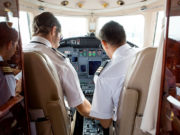ALEXANDRIA, Virginia — Flight Safety Foundation is urging the global commercial aviation industry to embrace a data-driven approach to pilot training, and says that national civil aviation authorities need to have the flexibility to adopt competency- or evidence-based training methods.
In a position paper issued today, the Foundation says, “It cannot be assumed that critical skills and knowledge will be obtained only through hours in the air.” In releasing the paper, Jon Beatty, president and CEO of the Foundation, said, “A data-driven approach to pilot training is an essential element in continuing to improve the industry’s safety performance. Training must target real-world risk and ensure a progressive and satisfactory performance standard.”
The Foundation acknowledged 2017 was the safest year in the history of commercial aviation, with no reported fatalities in commercial passenger jet operations worldwide. But with recent crashes occurring in Russia and Iran, the Foundation warned against the dangers of complacency.
The Foundation attributed the outstanding safety record of commercial aviation to “a wide variety of factors and the diligent efforts of thousands of aviation professionals around the world who design increasingly reliable aircraft, engines, and parts; maintain, repair and overhaul aircraft; regulate and enforce performance-based safety rules; investigate accidents and incidents; manage air traffic; develop sophisticated avionics and navigational aids; operate airports; and fly sophisticated aircraft in increasingly complex environments.” The Foundation noted: “It is not the result of any one factor, including any particular change in the hours requirement for pilot experience.”
The Foundation also cited the collection and analysis of a growing pool of safety data and information, enabling the industry to more effectively identify and mitigate risks before they lead to accidents.
Pilot experience, which also is an important safety factor, historically has been associated with the number of flight hours accumulated over a pilot’s career. What often is overlooked, however, is the quality of flight time and how it is accumulated. Was it in single- or multi-engine aircraft? In visual or instrument conditions? In a structured, professional environment, or in an often less intense, general aviation environment?
“The type of experience and the flight environment must be considered to provide meaning to the [flight hours] number,” the paper says.
In the position paper, the Foundation says the industry has reached a crossroads in determining how pilots need to be selected, hired, trained and mentored for career growth, and that changes need to be made if the industry is to continue its stellar safety performance in an era of expected rapid growth in many regions of the world.
“Flight Safety Foundation believes the pilot career path we have today will not take us where we need to go tomorrow,” the paper says. “It is time to take a data-driven, pragmatic approach.”
The Foundation issued several recommendations, including:
• An improved screening process and training for basic non-technical competencies that are usually obtained through experience, such as communication, analysis, problem solving, leadership and decision making;
• A renewed focus on the competency and quality of training providers to ensure training programs are developed and delivered to meet the safety standards of the industry, and so they can produce qualified, competent pilots;
• Training programs that are competency- or evidence-based and not solely hours-based;
• Data-driven training programs that are continually updated, based on pilot task–level performance;
• Ab initio programs with operator sponsorship/support;
• Development and sponsorship of worldwide quality/performance criteria that are universally recognized;
• A partnership with the International Civil Aviation Organization and industry to define rules, recommendations, guidelines and the expected quality and performance required of flight academies; and,
• Programs that place a high value on the knowledge and experience of instructors.
“The industry needs to be courageous and bold to make these changes and not simply rely on the ways of the past,” said Beatty. “Through these changes, the industry can continue to serve the needs of the airlines while enhancing safety standards on behalf of the traveling public.”
The position paper is available for download here.
###
About Flight Safety Foundation
Flight Safety Foundation is an independent, nonprofit, international organization engaged in research, education, advocacy and publishing to improve aviation safety. The Foundation’s mission is to connect, influence and lead global aviation safety.
Media Contact
Frank Jackman
jackman@flightsafety.org
+1 703.739.6700, ext. 116
